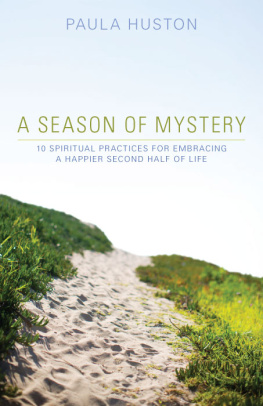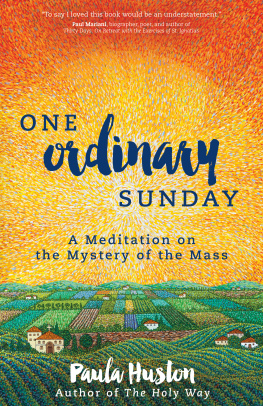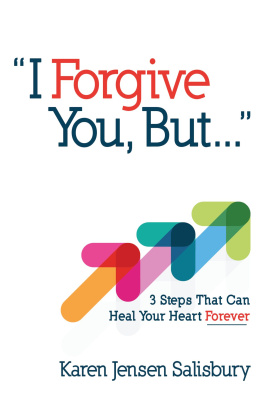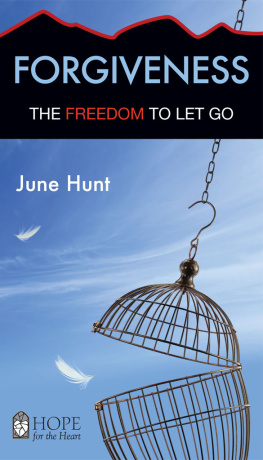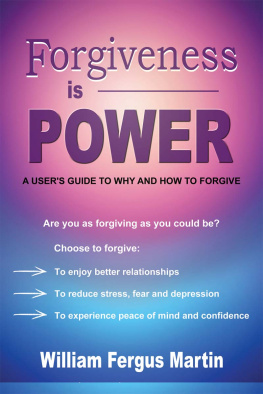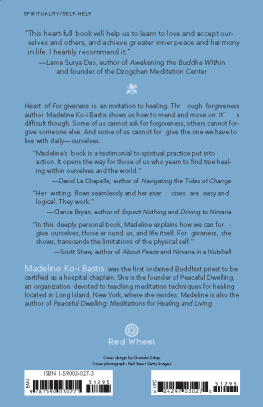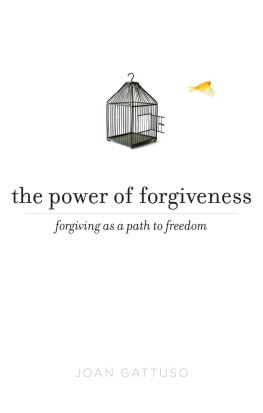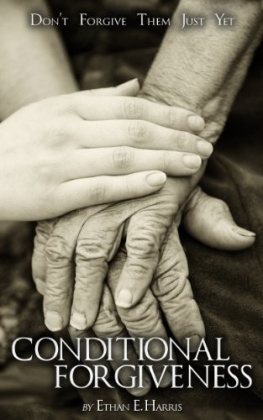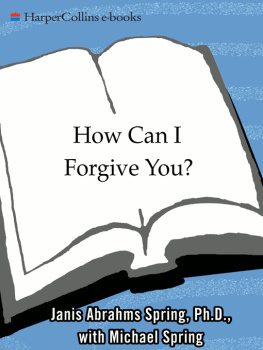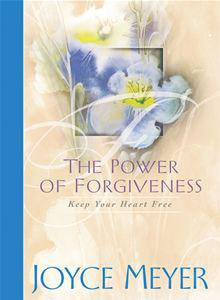praise for Paula Hustons books
An amazing, lovely, important book. Artful, wise.
RON HANSEN
author of Mariette in Ecstasy and Exiles
Paula is already one of those seasoned souls one comes to depend on, both for her well of refreshing knowledge, and for the wisdom that comes with such knowledge.
PAUL MARIANI
author of Deaths & Transfigurations
Paula has fully lived what she writes.
LUCI SHAW
author of Water My Soul and What the Light Was Like
Paula Huston has much in common with Kathleen Norris and Henri Nouwen... [She is] a credible witness to what happens when God is chosen as the center of ones life.
America: The National Catholic Weekly
With honesty and an open-armed embrace of her own fallibility, Huston pulls readers in, showing how odd and downright contrary it can feel to engage in a monastic disciplineand yet how fulfilling.
Los Angeles Times
forgiveness
following Jesus into radical loving
PAULA HUSTON

Forgiveness: Following Jesus into Radical Loving
2008 First Printing
Copyright 2008 by Paula Huston
ISBN: 978-1-55725-570-9
All Scripture quotations are taken from the New American Bible with Revised New Testament 1986, 1970 Confraternity of Christian Doctrine, Washington, D.C., and are used by permission of the copyright owner. All rights reserved.
Library of Congress Cataloging-in-Publication Data
Huston, Paula.
Forgiveness : following Jesus into radical loving / by Paula
Huston.
p. cm.
Includes bibliographical references.
ISBN 978-1-55725-570-9
1. ForgivenessReligious aspectsChristianity. 2. Forgiveness of sin. I. Title.
BV4647.F55H87 2008
234.5--dc22
2008033820
10 9 8 7 6 5 4 3 2 1
All rights reserved. No part of this book may be reproduced, stored in an electronic retrieval system, or transmitted in any form or by any meanselectronic, mechanical, photocopy, recording, or any otherexcept for brief quotations in printed reviews, without the prior permission of the publisher.
Published by Paraclete Press
Brewster, Massachusetts
www.paracletepress.com
Printed in the United States of America
contents
part 1
before we can forgive
part 2
preparing ourselves to forgive
part 3
forgiving
part 4
being forgiven
conclusion
the unforgiving world vs. the Kindom of God
introduction
FOR MANY YEARS, my younger brother, now one of my favorite people, was my nemesis. No matter how our battles startedand they were physical and fiercewhen it came time for the parental judgment call, I was invariably found to be at fault. This, I thought, was grossly unfair. No matter that I was four years older. From my perspective, he was the privileged male child, exempt from scullery duty and paidpaid!to mow the lawn, a job I passionately, irrationally, coveted. Plus, he was a tease, a conniving little beast who knew every weak and rotted plank in my character and purposely slammed his high-top Keds (I was jealous of them, too) down hard whenever he saw the opportunity. I blamed him for my having to serve time in the corner while the happy shrieks of the neighborhood kids drifted through the window like the life that was passing me by. I was convinced (completely wrongly, of course) that my mother loved him more than she loved me, and this precipitated clumsy, frantic efforts on my part to gain her attention. But no matter how I slaved for As at school or tried to impress her with my writing skills, I could not seem to pry his grubby little fingers off her heart.
However, one rainy afternoon all this changed. We kids were restless and bored and the situation was degenerating rapidly. I could see that look in his eye; he was plotting, I was sure of it, and soon full-blown teasing would erupt. And then I would hit him, and I would be in the corner again, and he would spend the rest of his day darting smirkily past me in my invisible cell. But somehow, our sister saved us; she plopped a record on the turntable and started to hum and spin. Though neither my brother nor I can put a finger on what happened nextno words were exchanged, or at least none that we can rememberwe suddenly found ourselves locked in one anothers arms, slow dancing to String of Pearls. I was twelve, he was eight, and not since he was a baby in his basinet (my baby, Id thought of him then) had I adored him so honestly and purely: so protectively.
In a twinkling, wed been released from mutual hostility, from blaming and recrimination, from smoldering jealousy and wishing ill upon the other. What was left after the sudden vaporization of habitual negativity was nothing short of miraculous: a delicate, courteous loving-kindness toward one another thatdespite a few setbacks when we were in our teenshas characterized our relationship ever since.
What we two had experienced, all unsuspecting, was grace. Though we were far too young to analyze what had gone wrong between us or who was to blame for it, and though we were still too immature to offer an apology to one another, deep inside we yearned for peace. That honest longing was all it took; God filled in the gaps for us, the gaps we were too young to negotiate on our own. Only now do I understand what a remarkable gift that sudden, unexpected reconciliation represented. Most of the time, forgiveness is not this unthinking or instantaneous. Instead, it is more often a complex, painful process, fraught as any novel with disappointments and reversals. Forgiveness is the final form of love, says theologian Reinhold Niebuhr, but lest we mistakenly assume that because we love, we are natural-born forgivers, Gandhi adds this caution: The weak can never forgive. Forgiveness is an attribute of the strong. Both of these twentieth-century social activists worked tirelessly for justice and human dignity. Neither of them doubted the reality of evil, much less took it lightly. Yet both believed that at the core of meaningful existence lies the terribly difficult task of forgiveness.
Why is forgiving such a challenge? From whichever perspective we approach itwhether we are trying to forgive someone who has hurt us, or are in dire need of forgiveness ourselveswhen we enter into the process, we find ourselves laid bare. The intense searchlight of mercy invades our every hiding place. We cannot go through being stripped of false dignity and self-justifying excuses without being changed. Transformation is unavoidable, for our blind eyes have been opened and now we see.
In my own case, it was a vengeful dream in my late thirties that transformed me. A self-absorbed and unstable person was making my life miserable by spreading malicious gossip. I was becoming a little crazy over the whole situation. All I could think of was how to stop the onslaught of hateful words. My anger was understandableeven justifiable. Until I dreamed of murder, however, I had no idea of how dangerous it is to nurture rage. I was shocked at myself. I had always thought I was a good and decent person, an enlightened being who worked for justice and peace. This level of killing anger did not fit into my view of myself.
I was also shaken by another realization. It appeared that there was an ironic aspect to forgivenessthat we often bear more animosity toward someone we have harmed than toward someone who has harmed us. As Quaker Jessamyn West points out, its easier to forgive others for the mistakes they make than for their witnessing our own, and this was certainly true in the case of my dream. The person who was tormenting me, the person I visualized shooting, was someone who had once admired me and wanted to be my friend. Though I was shocked by this realization and what it revealed about me, I had little idea of what to do about it now. At some level, I understood that taking its implications seriously would precipitate a major change in the way I saw the world, and this prospect was frightening. Despite my hidden shame, I preferred to keep things as they were; life was familiar this way, and I was comfortable with it.



